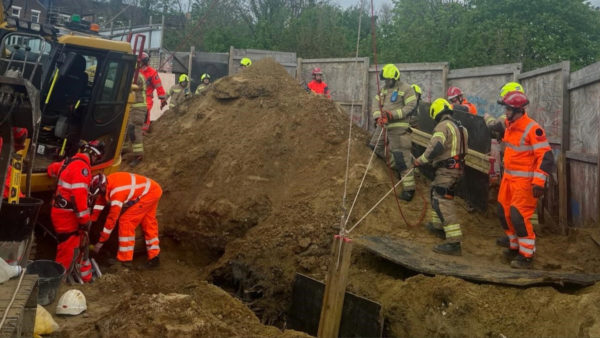We agonised over the issue a decade ago, but now a government study has put the issue of mandatory licensing for domestic builders back on the agenda. The pros and cons haven’t really changed, but the background landscape to the debate certainly has. Elaine Knutt reports. Illustration by Neil Shrubb.

Should you need a licence to build? It’s one of those questions construction wrestles with on a regular basis, weighing up the benefits of differentiation from the industry’s unqualified underbelly with the burden of bureaucracy and the headache of enforcement. But if the question is reframed as “would it benefit your business?” or “should domestic clients enjoy the same standards professional clients do?” or even “would it save lives?” then an increasing number of voices in the industry think we should at least be asking the question.
The Image of the Industry working group, drawing up its recommendations for the steering group for the government’s Industrial Strategy for Construction, chose to highlight the industry-wide upsides of a domestic contractors licensing scheme – although CM went to press before the strategy itself was launched. Earlier this year, the Department for Business, Innovation and Skills (BIS) commissioned a study of how licensing works in other countries, apparently prompted by the Meg’s Campaign pressure group, a move followed by briefings to the effect that BIS believes there’s a need for change.
Part of the argument is that the regulatory and consumer protection landscape has changed significantly since the industry last tackled the issue. Green Deal accreditation and the Microgeneration Certification Scheme have ushered in licensing for the retrofit and renewables markets; the Construction Skills Certification Scheme (CSCS) is a quasi-mandatory licence for individual operatives, and since 2006 we have had a mandatory licensing scheme for contractors working with asbestos. In this light, builder licensing could be the missing piece of the jigsaw – and the Green Deal and CSCS frameworks could provide a foundation for a future regime.
And while the emphasis in the past was on outlawing cowboy builders and improving customers’ experience, the shift is now towards the needs of the industry itself. BIS is believed to have drawn a link between the industry’s poor image among private clients – small and large – and its slow crawl out of recession.
Raising standards
According to Constructing Equality’s Chrissi McCarthy MCIOB, a member of the Image of the Industry working group, its concern was that professional, qualified small contractors needed licensing to raise standards: in project delivery, training, and safety management. “The people that are qualified and have good health and safety standards are often undercut by those who aren’t, so it forces the standard of the industry down. We think that licensing could start to push the standard up. This isn’t about the major contractors, there’s already a lot of regulation on larger sites and companies that really doesn’t exist in the domestic market.”
Chris Kane MCIOB, managing director of contractor Greendale and a member of the overall steering group, links licensing to a shift in public perceptions of the industry. “Everyone sees Rogue Traders or Cowboy Builders on TV, [and] the industry’s image is tarnished because of them. It’s [about] going to a meeting and people saying ‘this is the builder’ — it’s almost like people are putting you down.
“You’ll never fully stop the black market, there will always be some people who want to pay cash. But if you could make it mandatory to have a licence to trade, and with a scheme that includes some kind of checking of workmanship, I think it would benefit us a lot,” Kane says.

Complaints received by Citizens Advice
The current interest in licensing also has a health and safety angle. While the death and serious accident rate remains stubbornly high, it’s increasingly clear that the industry’s biggest safety problem is on small sites, where 70% of the fatalities occur. “We need to make the next breakthrough on safety culture — the accident rate has plateaued. So if the HSE said ‘we’ve exhausted other options’ we’d have to listen to them,” says Don Ward, chief executive of Constructing Excellence.
When CM asked the HSE whether it supported the idea of mandatory licensing, it replied with a statement that certainly leaves the door open: “HSE is aware that BIS is looking into this issue. We await with interest any subsequent proposals that may arise.” A spokesman added: “Small sites, such as many of those involved in refurbishment or other domestic construction projects, are a key target of HSE regulatory activity in construction, as this is where evidence shows that most fatalities and injuries happen in the industry.”
The BIS research that seems to have kick-started the debate is benchmarking the UK’s approach to licensing against other countries. It is due to be published later this year, although a BIS spokesman stresses that it will simply inform the debate, and not make recommendations for or against licensing. A similar survey by the European Construction Industry Federation shows that eight EU countries do have some form of mandatory licensing — in the case of Portugal, it was introduced as recently as 2011.
Technical design competence
But the research is also likely to reveal that other countries share our dilemma about licensing. In the Netherlands, for instance, there was soul-searching after two people died in 2003 when balconies on newly built high-rise apartments in Maastricht collapsed, triggering discussion of licensing for technical design competence. “It made the topic urgent. At first it looked as if it was bad design, but then it turned out to be the way it was built, and there wasn’t one party to blame. There was a lot of debate, but it didn’t turn into any actual action,” says a spokeswoman for Vernieuwing Bouw, which is allied to the UK’s Constructing Excellence.
If the argument is that licensing raises standards, some believe we need firm evidence that this principle has worked elsewhere. Peter Jacobs FCIOB, incoming CIOB president, struggles to see the link. “When I worked for Lend Lease I went back and forth to Australia, and I don’t think it’s made their industry more professional or raised its standards. So my view is not to bring in licensing, which just adds more bureaucracy, and get our act together as professional bodies and get professionalism properly recognised in the UK — and that will bring a far bigger pay-off than licensing. The industry already has all the right standards, let’s get them working properly.”
Jacobs’ point about the need to get existing standards and industry accreditation to work better are shared by many in the industry, including the respondents in last month’s CM vox pop. And Jo Streeten, head of project management at Davis Langdon, argues that the industry is considering licensing at the wrong time in the cycle. “Regulation would probably stagnate the industry even more, and make the pool that [domestic] clients can select from even smaller. We’ve shrunk down over the past five years, and if you introduce regulation now the risk of [under-supply] will be even more if the market picks up.”
Furthermore, there’s little to suggest that the industry needs a licensing system to tackle a rising tide of incompetent traders. The number of complaints received last year by Citizens Advice – which took over the functions of Consumer Direct – show that there was actually a modest decline last year. It categorises complaints under general building work, and other home maintenance trades, including roofing, plumbing, insulation, and kitchen fitting (see bar chart, p16). Combining the two categories, the total in 2012/13 was 58,868, compared to 64,780 in 2011/12. In comparison, there were 70,283 complaints about the used car sector last year.
Countries with mandatory licensing schemes

1. Portugal A mandatory system for all works has been in force since July 2011. Contractors are registered in nine classes according to the contract value, with the values updated each year.
2. Spain A mandatory system for public works valued over €350,000. Contractors are registered in six classes according to project size, and in sub-categories related to the type of activities.
3. Belgium Licenses are mandatory for public and private work. Contractors are registered in eight classes according to the size of the project, and in categories according to activities.
4. Italy Mandatory licensing for public contracts over €150,000, or private contracts more than 50% financed by public funds.
5. Norway Mandatory licensing for all works. Applicants for building permits must prove that their intended contractor/s and designer/s have the right documents for the work in question.
6. Lithuania A mandatory licensing system for complex building projects, with registration available at different levels.
7. Bulgaria Licenses needed for specific categories of public and private works, namely high-rise buildings, transport infrastructure, power infrastructure and utilities.
8. Greece Contractors have to be registered to undertake public works, with eight different classes of registration by project value.
9. Cyprus Contractors are licensed for public and private works, and registered in five different classes according to the size/value of the project.
Moving forward
Nevertheless, others believe that an industry that wants to move forward – on sustainability and energy efficiency, on attracting and retaining the right skills, on innovation and raising standards – needs to look at any strategies that can help. Constructing Excellence’s Ward is certainly open to the idea of a renewed debate. “We’re two years away from a general election. Now is the perfect time to start building a campaign that one of the parties might adopt,” he says.
But Ward also makes the point that you can only design a licensing system – and an enforcement regime to go with it – if you know exactly what you want it to do. “What difference does it make, what problem is it trying to solve? Is it rogue trading? Health and safety? Technical competence? Or is about creating an entry barrier? Without that, you’ve got an over-supply, which leads to commodity purchasing and stupidly low pricing,” he says.
Certainly, the debate so far has shown that licensing means different things to different people. For some it’s first and foremost about technical competence – the underlying issue in the death of three year old Meg Burgess in Prestatyn in 2008 was that the contractor was operating beyond his technical competence. “That’s the biggest issue – we have no differentiation on competence,” says Constructing Equality’s McCarthy. “In the domestic market, there are people that say they can build, but nothing that proves your competence.”
She cites the problems she had trying to work out which of the local traders offering to build her conservatory were actually up to the job. “Yes, it would be extraordinarily complicated to set up an accreditation system, there isn’t necessarily a technical competence certificate around. And whatever happens, it needs to support the industry, and not just become a burden upon it, that would do more harm than good. But if done correctly, it could help the industry.”

Supporters of a licensing scheme say it would help to eradicate safety breaches seen in the HSE’s latest safety blitz (above) and prevent tragedies such as the wall collapse that killed three-year-old Meg Burgess in 2008 (below)

FMB Cymru, geographically and emotionally closest to Meg’s Campaign, has also signalled that it wants to see a mandatory Welsh scheme based on a technical competence standard. Director Richard Jenkins says: “The contractor involved mostly did landscape stuff, but a licensing scheme could have prevented him doing that [treating a boundary wall as a retaining wall]. If he’d been able to say, ‘I can’t do that, I’d lose my licence’, it might have made a difference.”
In the meantime TrustMark, the closest thing we have to a licensing scheme, is positioning itself as the logical option if government and industry decided to pursue a toughened “voluntary” standard. It is an umbrella brand uniting 31 industry consumer protection and Competent Person schemes, with members of qualifying schemes automatically becoming members of TrustMark. Ongoing plans to strengthen members’ vetting procedures and raise standards concentrate on consumer protection rather than technical competence.
Improved profitability
Chairman Liz Male, who also sat on the Image of the Industry working group, argues that a tougher voluntary regime, supported by the industry, insurance companies and mortgage lenders, could have a significant impact on members’ businesses and the industry’s image. “What effect does the white van man have on public confidence, and the ability of the construction industry to get maximum value [from the work it undertakes], and attract and keep young talent? You can’t charge top dollar for work if there’s a perception everyone out there is a cowboy. The perception of construction as a whole is influenced by the domestic RMI sector,” she says.
Another industry body positioning itself for a role in any future scheme is the CSCS. Chief executive Graham Wren has told CM that its new focus on workers’ competency – alongside its association with safe working – puts it in a strong position to be part of a new scheme. “When Mrs Jones is getting her extension built, that builder may well have employees who carry CSCS cards. But Mrs Jones doesn’t know about it, so wouldn’t ask or check. So should the scheme be required across the domestic sector?
“I see CSCS as one element that could help, although it wouldn’t be the ‘licensing body’ in itself. A lot of [contractors working in the domestic sector] will already have people who are CSCS carded, so it could help if something was set up.”
Or is the focus on creating Ward’s “barrier to entry” reducing the risk of losing work to underqualified competitors? That’s the view of Greendale’s Kane, who believes it should be accompanied by other measures to reduce the incentive to hire a less-than-legitimate trader, such as banning cash payments in builders’ merchants. “It would restrict the cash economy – and that makes the proper builders more cost-competitive by 20%.”
But even if a future consultation found some agreement on what licensing was supposed to do, and an appetite for reform, the challenge of setting up and enforcing an effective scheme would be huge; the Green Deal accreditation framework is incredibly complex, and we haven’t yet seen how the enforcement regime deals with customer complaints or technical failures.
Kane suggests that the licensing scheme could be run by the Federation of Master Builders, perhaps operating on a “licence” from government and/or the industry. “They already have a massive database, and are set up to run something similar. The likes of Balfour Beatty would also have to join, but they’d just walk through it.”
Ward suggests tiered accreditation: a basic level that would get you over the threshold of someone’s house, then higher-level accreditation would be needed to take on more complex work.
Public awareness
But everyone agrees that a workable scheme would need a high level of public awareness. “You would need a big awareness campaign for the ‘scheme’,” Ward says. “If it’s in the industry’s interests to have a scheme – because it limits competition – then they should be the ones paying for the scheme [rather than the taxpayer].” But rather than generalised awareness, he talks of a targeted approach, advertising through DIY stores, council building control departments and Citizens Advice.
At the moment, it’s too soon to say that licensing is the way forward. As Ward says, there first needs to be agreement on the problems licensing is trying to solve before it can be judged whether a scheme could deliver those objectives, or simply generate more problems. But as the overall landscape around the industry shifts in favour of regulation and oversight – whether in banking, public office, the food sector or the NHS – then it might increasingly look as if construction needs to do more to meet expectations.
Comments
Comments are closed.









Most defects, liabilities and failures are often a result of a combination of mistakes, which lead to accidents. It is so important to have both experienced & competent trades skilled workforce; engineers & those who are scientifically aware to mitigate accidents during & post construction.
The days of the application of ‘Management & Technology’, which used to be applied with its greater focus on professional and tradesman’s delivery have, more recently, tended to be forgotten. Possibly this is due to the financial short-term demands, which so often uncut delivery quality standards and the training needed to achieve it.
Who, these days, really appreciates that quality standards are written in codes and EN/BS or Agreement Certifications purely to give assurance both during the design & construction process as well as for the end result and long-term user’s safety?
This is why it is so important to have well trained people, who know the extent of their own knowledge, yet are supervised by those who are able to take a holistic approach, and advise.
If you take a look at the Scandinavian approach: their workmen are called invariably “Technicians” and proud of their skill and craft, as well as being respected and they deliver a high quality of work. Unfortunately, in more hierarchical based societies, old by tradition and status based, problems of excellence in quality standards are much harder to achieve. This is why both technologist & engineer should also have a trades based experience and not just an academic one, and tradesmen/technicians be encouraged to take continual development.
Do not do it, it will cost; do it and it will costs less and the benefits are greater in the long-term.
I am a Project Manager working in Australia and have gained my B class licence based upon my CIOB degree and find the system works well here. Domestic builders must sit a diploma course and pass to gain their C Class licence otherwise they can not carry out new house construction. Health and safety breaches under the small builder are still too common, however there is the threat of withdrawing of licences plus knowlege of the regulations which means these guys have no excuse for breaking the rules.
I work in France where ‘decennial’ insurance is required for all building work. This provides a guarantee of up to a ten years on the work. The insurance premium is paid yearly and there is no requirement to continue to pay premiums to maintain the 10 year cover. So if a company goes out of business the insurance remains. When starting out it is very expensive as it essentially works on a no-claims basis. Very quick and easy to see what trades the builder is insured to undertake.
Perhaps a list of Prelims. and costs regarding the Health and Safety requirements should be identified in detail at tender stage to ensure all items are covered, priced and utilised.
Of course the Client will incur additional costs for their works to be undertaken safely and professionally but there is no excuse for not providing the prerequisite items.
It should remain the Client’s Duty to ensure these facilitating works are supplied and paid for.
As an alternative , the Building Regulations could be made to cover the requirement, as the original permit to build.
A solution outlined : and CIOB could drive it!!
Introduce compulsory 30 year latent defects insurance provision for all domestic building work. The insurance cover can be assigned by each householder/owner when they sell on. With the latent defects cover comes with 3rd party quality audits & inspections & funder approvals prior to provision of funding.LA Building Control to sign off the work as they do now.
Also CIOB could re write the Chartered Builder rules to suit the market requirements.
Andrew Nicholson
Licensing of the construction industry especially at the SMEs and micro SMEs end will be particularly difficult to enforce and administer, especially for those companies working in the private sector . Remember we are an industry that is driven by cost. Clients will almost always consider cost against, regulation, quality, and health and safety.
CSCS carded contractors really do not carry much clout, as other credit card schemes can be less expensive to obtain, and will be accept and recognised under the law by larger contractors. It is very difficult for SMEs And Micro SMEs to trade under all the current legislation and bureaucracy entailed in construction activities. Lenders should only consider clients using approved contractors as in Constructionline registered businesses, CBC approved businesses etc. The Industrial Strategy for Construction group needs to consider the barriers for SMEs and micro SMEs joining a licensed scheme. it also needs to be looked at from clients and the public in general, clients also have a duty of care towards the contractor they employ.
The quality standards already exist, though publicity may be lacking, resulting in poor public awareness. The FMB and NFB already operate insurance backed guarantee schemes, though they prove difficult to sell in practice. Their members are vetted and policed for quality and good practice and of course your deliberations do not mention the possible role of the CBC scheme. I lobbied for a similar scheme in the mid eighties on behalf of the NFB but the stance of Mrs Thatcher’s government was resolutely to let market forces rule. Caveat Emptor!